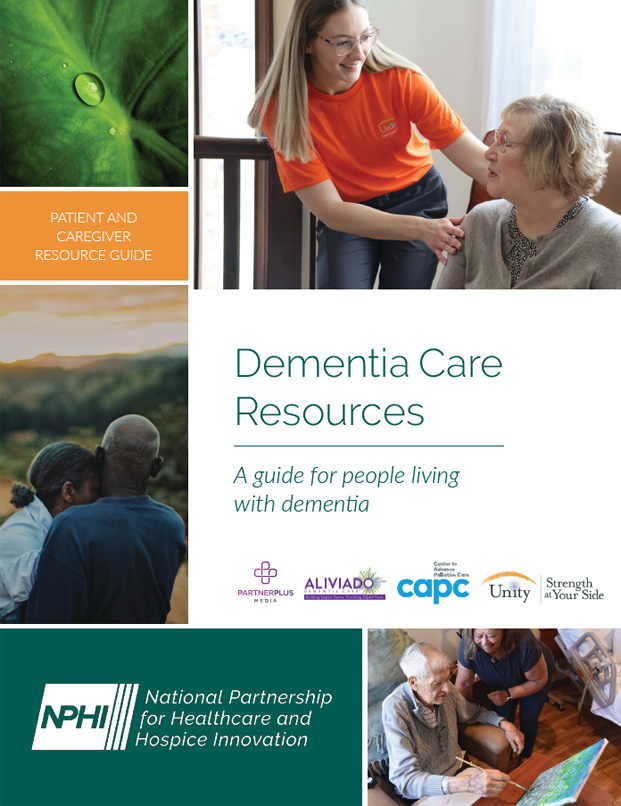Access Unity's Free Patient and Caregiver Dementia Resource Guide
1 in 2 of us will be impacted by dementia or Alzheimer’s in our lifetime, either by caring for a loved one with the condition or developing dementia or Alzheimer’s ourselves. As Northeast Wisconsin’s pioneering nonprofit provider of hospice and palliative care, Unity believes no one should face the challenges of dementia alone. Unity is sharing its Dementia Resource Guide with the public for free. Created in collaboration with the National Partnership for Healthcare and Hospice Innovation, the comprehensive guide is designed to support home care for individuals living with dementia and provide caregivers, including families, with the necessary skills and information to ensure patient safety, comfort, and well-being while reducing caregiver burden. Unity is proud to support patients and families living with Dementia with the best standards of care for mid, to advanced, to end-stage dementia with the collective input of 100+ not-for-profit hospice, palliative, and advanced illness care organizations.
Understanding Dementia
Dementia is not a single disease, but a general term for many conditions that cause losses in thinking, remembering, and reasoning skills, also known as cognitive abilities. These losses become so severe that they interfere with a person’s daily life. They also impact behavior, feelings and relationships. Here are some common diagnoses that fall under the dementia umbrella:
- Alzheimer’s Disease: The most common type of dementia, characterized by progressive memory loss and cognitive decline.
- Vascular Dementia: Often resulting from a stroke or other blood flow issues, this type can cause problems with reasoning, planning, and judgment.
- Lewy Body Dementia: This type involves abnormal protein deposits in the brain, leading to cognitive decline, visual hallucinations, and movement issues.
- Frontotemporal Dementia: This affects the frontal and temporal lobes of the brain, impacting personality, behavior, and language skills.
- Mixed Dementia: A combination of two or more types of dementia, commonly Alzheimer’s and vascular dementia.
Alzheimer’s and other types of dementia kill more than breast cancer and prostate cancer combined.
How do I know when it’s time to get additional support?
Signs and symptoms of dementia vary depending on the type of disease and may include:
- Trouble handling money responsibly and paying bills
- Repeating questions
- Experiencing memory loss, poor judgment, and confusion
- Using unusual words to refer to familiar objects
- Taking longer to complete normal daily tasks and getting to the stage of needing assistance
- Difficulty speaking, understanding and expressing thoughts, or reading and writing
- Wandering and getting lost in a familiar neighborhood
- Acting impulsively
- Not caring about other people’s feelings
- Losing balance and problems with movement
Download Unity's Dementia Care Resource Guide
How Unity Can Support Those Living with Dementia
Alzheimer’s disease and other forms of dementia, are progressive illnesses, meaning they develop gradually over time. In most cases, the progression takes years, so a patient’s needs change and become more involved as time passes. Unity offers three services tailored to meet the unique needs of individuals and families living with dementia.
- Care Companions: Unity’s in-home, non-medical care program called Care Companions, matches patients with a trained caregiver to assist with everyday activities like preparing meals, bathing, grooming, taking medications, housekeeping, running errands, and more. As the disease progresses and needs become even more complex, Unity can seamlessly transition the patient to a higher level of support, including Unity’s palliative or hospice programs.
- Supportive Care Management: Unity’s palliative care program is appropriate at any stage of dementia and uses a team-centered approach to focus on the management of dementia symptoms while providing education and resources to help families navigate the complexities of dementia care.
- Hospice Care: Unity’s hospice care focuses on enhancing the quality of life for those living with advanced dementia, through pain and symptom management, personalized care plans, and emotional and spiritual support for patients and families
If you think you and your family could benefit from the support of home care visits from a team who specializes in Dementia, call Unity. You do not need a referral from a doctor to contact Unity. For questions or to refer a loved one, please contact Unity at 920-338-1111. Contacting Unity is a choice that can lead to fewer worries for you and a better quality of remaining life for your loved one.







